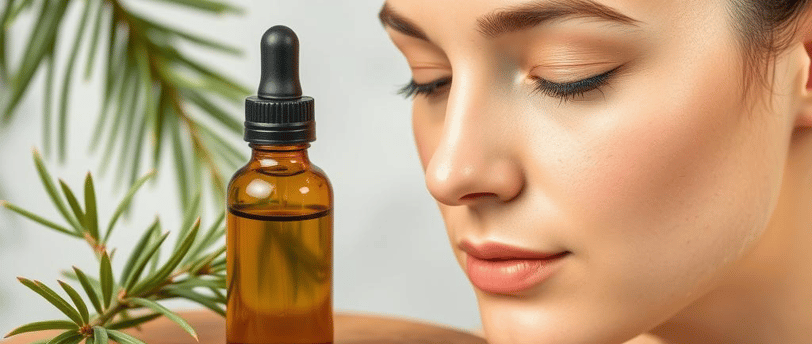Tea Tree Oil for Acne: A Natural Solution for Clear Skin?
✨SKIN HEALTH


Acne, a common skin condition affecting millions, can be a persistent and frustrating problem. While numerous over-the-counter and prescription treatments exist, many people are turning to natural remedies for a gentler approach. Among these, tea tree oil has emerged as a popular choice, lauded for its potential to combat acne and promote clearer skin.
But is tea tree oil truly effective against acne, and how should you use it safely? Let's delve into the science behind this natural remedy and explore its potential benefits and drawbacks.
What is Tea Tree Oil?
Tea tree oil, also known as melaleuca oil, is extracted from the leaves of the Melaleuca alternifolia tree, native to Australia. It's a potent essential oil with a characteristic camphoraceous scent. The active components responsible for its therapeutic properties, particularly its antibacterial and anti-inflammatory effects, are thought to be terpinene-4-ol and other terpenes.
How Does Tea Tree Oil Work Against Acne?
Acne is often caused by a combination of factors, including:
Excess Sebum Production: Overactive sebaceous glands produce too much oil, clogging pores.
Bacteria: Propionibacterium acnes (P. acnes) bacteria thrives in clogged pores, causing inflammation.
Inflammation: The body's immune response to bacteria leads to redness, swelling, and painful acne lesions.
Tea tree oil addresses these factors in several ways:
Antibacterial Properties: Studies have shown that tea tree oil can effectively kill P. acnes bacteria, reducing the bacterial load within pores and minimizing inflammation.
Anti-inflammatory Properties: It can help reduce the redness, swelling, and pain associated with acne breakouts.
Potential Sebum Control: While research is still ongoing, some evidence suggests that tea tree oil might help regulate sebum production, further preventing clogged pores.
The Science Behind the Claims:
Several studies support the effectiveness of tea tree oil for acne. A comparison study published in the British Medical Journal found that a 5% tea tree oil gel was as effective as a 5% benzoyl peroxide lotion in treating mild to moderate acne, although tea tree oil worked more slowly. Another study in the Australasian Journal of Dermatology showed that tea tree oil significantly reduced the number of inflamed and non-inflamed acne lesions.
How to Use Tea Tree Oil for Acne:
Due to its potency, tea tree oil should always be diluted before applying it to the skin. Direct application can cause irritation, redness, and even blistering. Here's a safe way to incorporate tea tree oil into your skincare routine:
Patch Test: Before using tea tree oil on your face, perform a patch test on a small, inconspicuous area of skin (like your inner arm) to check for any adverse reactions.
Dilution is Key: Mix 1-2 drops of tea tree oil with 12 drops of a carrier oil like jojoba, coconut, almond, or grapeseed oil.
Application: Apply the diluted oil directly to pimples using a cotton swab. Avoid applying it to the entire face unless you are using it as a spot treatment for widespread acne.
Frequency: Start with once-daily application and gradually increase to twice daily if well-tolerated.
Leave-on Treatment: Allow the oil to absorb into the skin. You can leave it on overnight or rinse it off after 20-30 minutes.
Tea Tree Oil Infused Products: Look for cleansers, creams, and serums that contain tea tree oil. Make sure the concentration of tea tree oil in these products is appropriate (generally between 5-10%).
Potential Side Effects and Precautions:
While generally considered safe for topical use when properly diluted, tea tree oil can cause:
Skin Irritation: Redness, itching, burning, and dryness.
Allergic Reactions: In some individuals, tea tree oil can trigger an allergic reaction, resulting in rash, hives, or difficulty breathing.
Photosensitivity: Tea tree oil might make your skin more sensitive to sunlight, so it's important to wear sunscreen after application.
Avoid Ingestion: Never ingest tea tree oil, as it can be toxic.
Not Recommended for Pregnant or Breastfeeding Women: Limited research is available on the safety of tea tree oil during pregnancy or breastfeeding. Consult with your doctor before use.
The Bottom Line:
Tea tree oil can be a valuable natural remedy for acne, thanks to its antibacterial and anti-inflammatory properties. However, it's crucial to use it cautiously and with proper dilution to avoid potential skin irritation. While tea tree oil may be effective for mild to moderate acne, it might not be sufficient for severe cases.
Consult a Dermatologist:
If your acne is severe, persistent, or not responding to over-the-counter treatments, it's essential to consult a dermatologist. They can provide a proper diagnosis and recommend a personalized treatment plan that might include prescription medications or other therapies.
Tea tree oil can be a helpful addition to your skincare routine, but it shouldn't be considered a sole solution for acne. Combine it with a healthy lifestyle, a gentle skincare regimen, and professional guidance when necessary for the best results and clearer, healthier skin.
